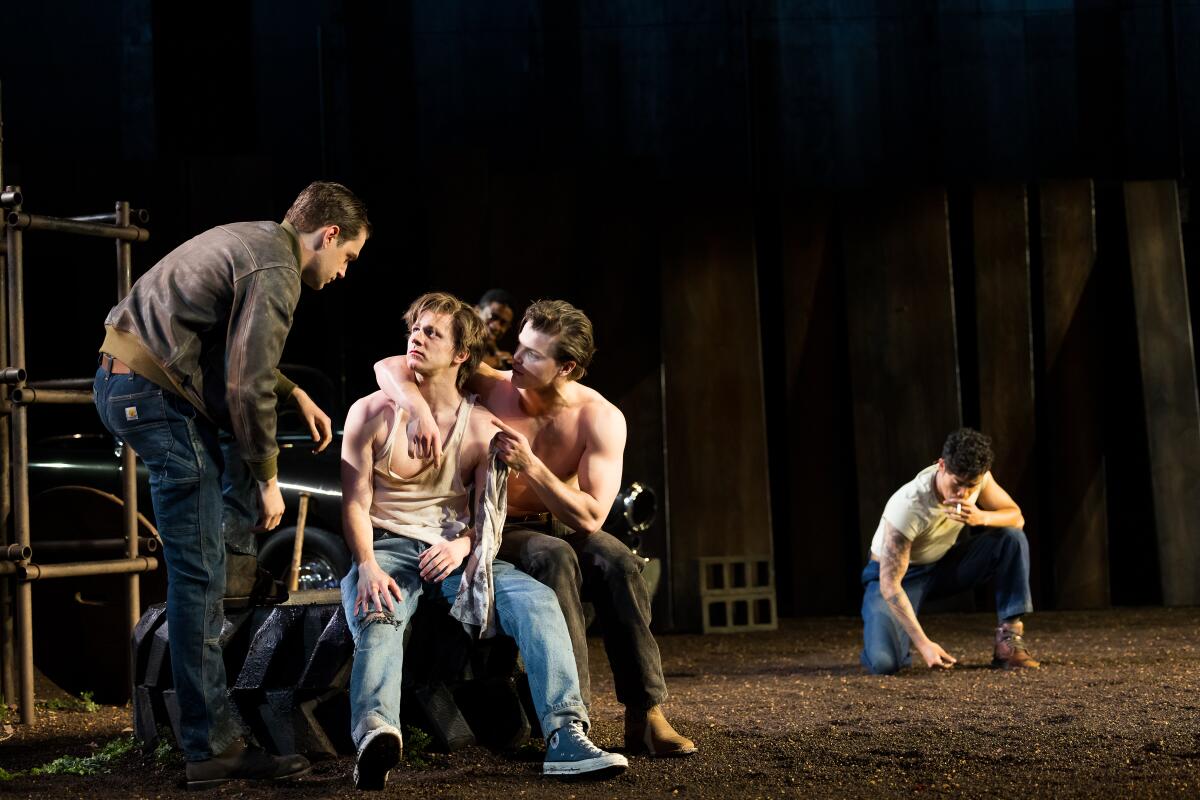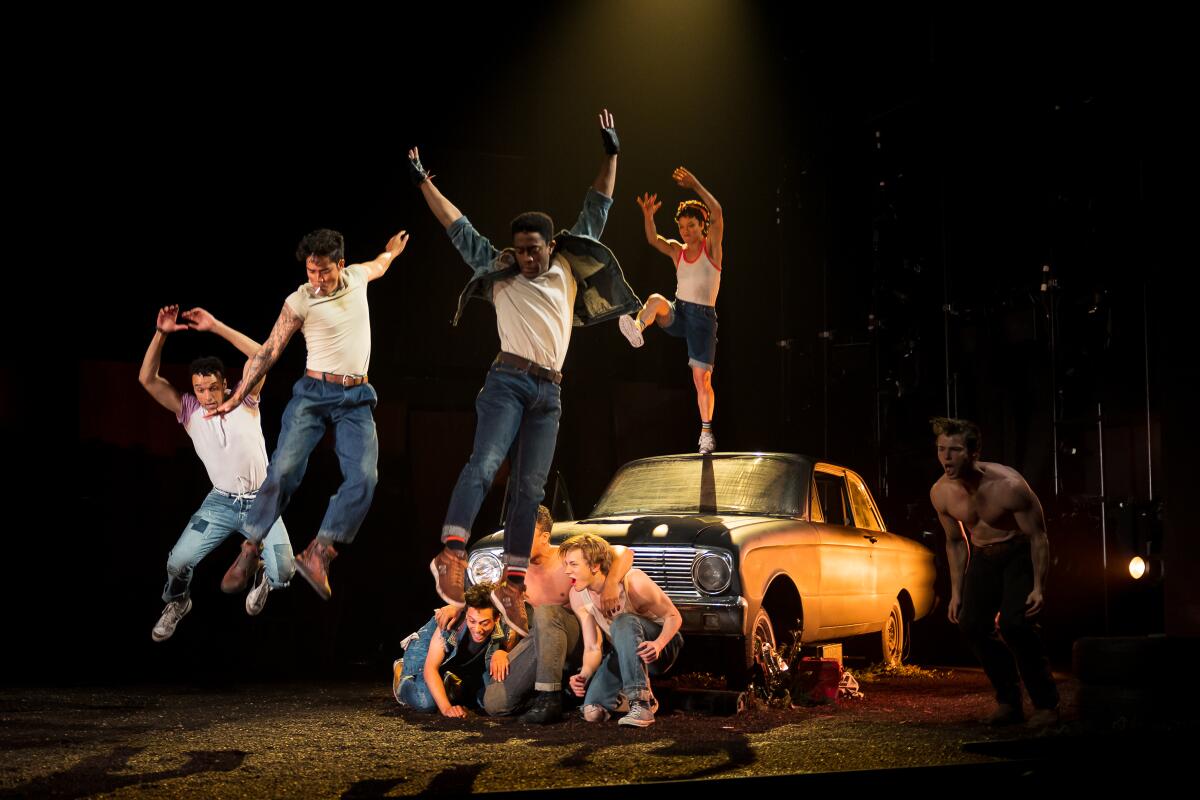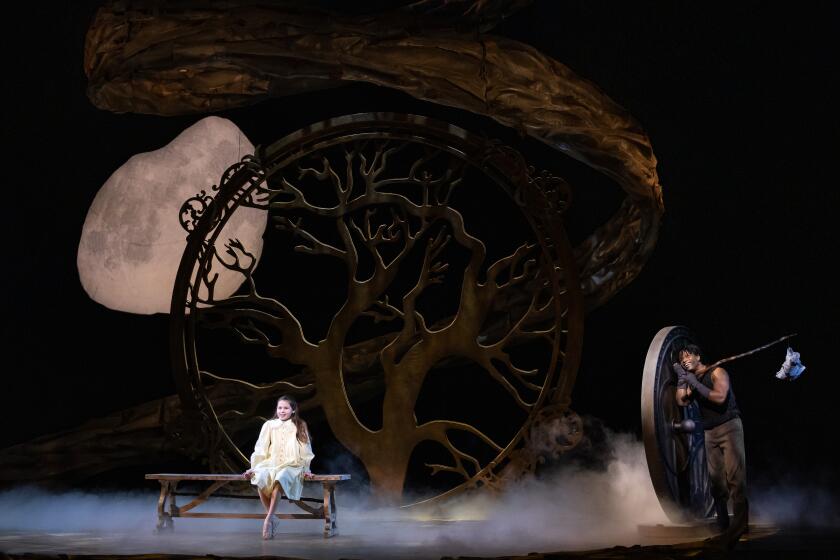Review: A hypnotic new musical adaptation of ‘The Outsiders’ stays gold

- Share via
It’s a testament to the enduring power of “The Outsiders,” S.E. Hinton’s classic young-adult novel, that my dreams started to parallel the nightmarish situation of the characters as soon as I began rereading the book. A respectable middle-aged man by day, I found myself on the streets with my best buddy from high school at bedtime, trying to survive a crisis that kept spiraling into an ever-more appalling disaster.
Hinton’s story has the same dark enchantment that the writer Bruno Bettelheim identified in fairy tales. The message of these works, according to Bettelheim, is “that a struggle against severe difficulties in life is unavoidable, is an intrinsic part of human existence — but that if one does not shy away, but steadfastly meets unexpected and often unjust hardships, one masters all obstacles and at the end emerges victorious.”
“The Outsiders” adds to this time-tested recipe a note of stark realism. Hinton, astonishingly, wrote the book when she was in high school. The violence of adolescence is fresh to her, the injuries that occur don’t magically heal, and when death comes, it’s a permanent condition.
Adapting “The Outsiders” is no easy feat, as Francis Ford Coppola found out in his inert 1983 film, best remembered as a showcase for such future Hollywood megastars as Matt Dillon, Patrick Swayze, Rob Lowe and Tom Cruise. The movie races through the plot, as though victory lies in crossing the finish line.
But the book’s strength is novelistic, which is to say it impresses itself upon us more through reflection than direct dramatization. The story is gripping, don’t get me wrong. But it’s the protagonist’s meditation on events that keeps the jam-packed tale from seeming clunky and contrived.
The musical version of “The Outsiders,” which is having its world premiere at La Jolla Playhouse, recognizes these hazards. The show, based on both Hinton’s novel and Coppola’s film, lets the music by Jamestown Revival (Jonathan Clay and Zach Chance) and Justin Levine guide the storytelling.
The score has a folk-rock sound that seems completely natural to the story without locking it into a specific period. The songs work best when they give expression to the inner lives of the central characters (though the soul-searching on the periphery could use some pruning).
The lyrics have a fresh charge but are sometimes overtaxed with too much narrative work. When the music is enjoined to shift the production into high gear, the ensuing reverie doesn’t always feel earned. But I appreciated the creative boldness of the songwriting.
The production, directed by Danya Taymor, is impressively original despite being lumpy in places and incoherent in others. I feared that a commercial Broadway formula would be applied, but I left exhilarated by the artistic risk-taking. The show is a thrilling mess.
The book is by Adam Rapp, a prolific playwright with a gritty, offbeat style. (I’m still waiting for someone in L.A. to do his fine play “The Sound Inside.”) Rapp takes small yet noticeable liberties with the novel, adding humanizing dimensions to some of the characters in an effort to be less schematic. He’s not as tough as Hinton. Some mushiness creeps in, but the narrative outline is effectively rendered.
Ponyboy Curtis, the 14-year-old protagonist and narrator who’s being raised by his two older brothers after the death of their parents in a car accident, is still the center of the story. But this coming-of-age tale, set amid the enmity between rival gangs, takes on the properties of an unstoppable dream.
The street war between the working-class Greasers and the affluent Socs escalates into brutality on a surreal scenic landscape (designed by Amp featuring Tatiana Kahvegian) that conjures each setting out of the detritus of an abandoned lot. Home, a drive-in movie theater, a dingy park and a hospital room are demarcated with the rearrangement of old tires, cinder blocks and spare wood.
The violence is made real, even when it’s stylized in the kinetic battle scene in the second act. The choreography by Rick and Jeff Kuperman becomes more flamboyantly muscular as bodies are pummeled in a storm that is literal as well as unapologetically metaphoric.
The musical manages the trick of maintaining one foot in 1967 Tulsa and one foot in a neutral contemporary reality. The logic may have some holes, but I was able to suspend my disbelief — something I had trouble doing when watching the more straightforward movie.
The Greasers, the side Ponyboy was born into, are now racially diverse. Sensitive and bright, he refuses to internalize the “Tulsa trash” label that’s hurled at him. Bad economic luck, however, has limited his options. He survives through the protection of his fellow Greasers, his surrogate family.
In a star-making performance, Brody Grant fills the role of Ponyboy with moody rock-star charisma. Vocally, he soars when communicating his character’s longings in song. The stirring early number “Great Expectations,” inspired by the Charles Dickens novel Ponyboy is reading, seems to emerge from the deepest pocket of his soul.

Johnny, who lovingly follows Ponyboy around town, is traumatized both by his violent upbringing in an alcoholic household and by the recent beating he took by the Socs that left his face scarred and his sense of safety shattered. Sky Lakota-Lynch, peering out from behind his character’s wounds, imbues Johnny with an aching, tender silence.
When Johnny and Ponyboy are on the lam after a member of the Socs is slain, they become almost fused into a single entity. They don’t need many words to understand each other, but they offer companionship and consolation in song.
Da’Von T. Moody plays Dallas, a gun-toting, tire-slashing troublemaker who turns into one of the musical’s tragic heroes. His more offensive qualities have been toned down and his nurturing, empathetic spirit has been expanded. He treats Ponyboy and Johnny like kid brothers in need of defending. It’s a softer take on the character, but Moody makes sure we never lose sight of Dallas’ deadly swagger.
Darrel, Ponyboy’s eldest brother who has sacrificed his own future to keep a roof over his baby brother’s head, is a more paternal figure now. Less enthralled by his own muscles and not as eager to brawl, he is a Greaser in name only. Ryan Vasquez accentuates the earnestness of this retooled characterization but unleashes a tornado of emotion when released into song.
The Socs are portrayed as preppy, privileged savages. Bob (Kevin William Paul) dresses like a college boy and acts like a sociopath. His girlfriend, Cherry (Piper Patterson), who is portrayed in a more generous light than in the novel, knows how dangerous he can be after a few drinks. She looks past his dark side without condoning it. Over time, she begins to see there’s more to the Greasers than greasy hair and vile manners.
The musical doesn’t stint on head-bashing, but the viciousness is mostly on the surface — at least for the Greasers. Sodapop (Jason Schmidt), the good-looking middle brother of the Curtis family, cuddles Ponyboy at bedtime when his younger brother seems especially anxious. Johnny and Ponyboy are also unusually physical demonstrative. At one point I wondered if they were about to kiss.
Apparently these gang members are living in a masculine utopia, where no boy ever has to fear a homophobic slur. It’s an appealing vision, though it adds another strain of sentimentality to the show.
But “The Outsiders” is intent on finding the redeeming value in characters who have been written off by society. Ponyboy is haunted by Robert Frost’s poem “Nothing Gold Can Stay.” Johnny urges him to “stay gold,” his words giving rise to one of the production’s key second act songs.
The musical, even at this somewhat wobbly preliminary stage, holds on to the gold of Hinton’s novel, transmuting it imperfectly yet courageously into hypnotic theater.
'The Outsiders'
Where: La Jolla Playhouse, 2910 La Jolla Village Drive, La Jolla
When: 7:30 p.m. Tuesdays-Wednesdays, 8 p.m. Thursdays-Fridays, 2 and 8 p.m. Saturdays, 2 and 7 p.m. Sundays. Ends April 2.
Tickets: Start at $25
Info: LaJollaPlayhouse.org, (858) 550-1010
Running time: 2 hours, 35 minutes
Marsha Norman and Lucy Simon’s musical, based on Frances Hodgson Burnett’s beloved children’s novel, gets a new production at at the Ahmanson Theatre with Broadway in the show’s sights.
More to Read
The biggest entertainment stories
Get our big stories about Hollywood, film, television, music, arts, culture and more right in your inbox as soon as they publish.
You may occasionally receive promotional content from the Los Angeles Times.












